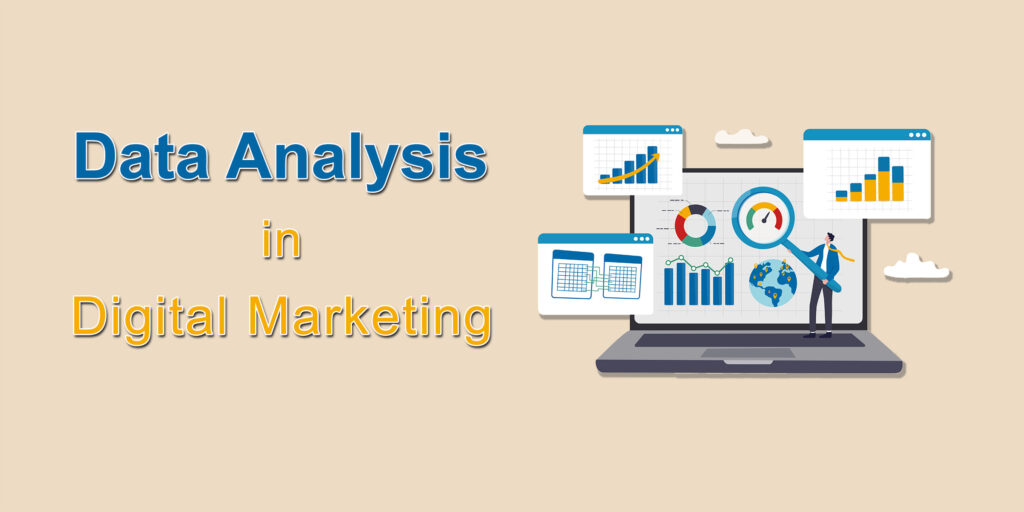In today’s digital world, where technology evolves at an unprecedented pace, businesses are constantly seeking innovative ways to reach their target audience and gain a competitive edge. One of the most powerful tools in their arsenal is digital marketing. It has transformed the way companies promote their products and services, allowing them to connect with a global audience instantly. However, the success of digital marketing campaigns hinges on one vital element: data analysis. In this article, we will explore why data analysis is of paramount importance in digital marketing and how it can significantly impact campaign effectiveness and return on investment.
1. Digital Marketing Relies on Data for Efficiency
Digital marketing is a dynamic and data-driven field. Unlike traditional advertising, it allows businesses to harness the power of data for precise targeting. Every interaction, click, and conversion in the digital realm generates valuable data that can be harnessed to improve marketing strategies. Without data analysis, digital marketing campaigns would be like navigating in the dark, devoid of insights to guide decision-making.
One of the primary advantages of data analysis in digital marketing is the ability to increase efficiency and avoid wastage of spending. With accurate data, marketers can identify the most effective channels, audiences, and messaging to allocate their resources wisely. This enables them to reach potential customers who are more likely to convert, thereby maximizing the return on investment (ROI) and minimizing ad spend on uninterested or irrelevant audiences.
2. Utilizing Running Data for Continuous Improvement
Digital marketing campaigns are dynamic and generate a continuous stream of data while they are active. This data is a goldmine of insights waiting to be uncovered. However, failing to analyze this running data is akin to missing a tremendous opportunity for improvement. Digital marketers can use this data to adjust their strategies in real-time and fine-tune their campaigns for better results.
Consider this scenario: a retail company runs a paid advertising campaign on social media. During the campaign, they notice that one particular ad creative is performing exceptionally well in terms of click-through rate (CTR) and conversions, while another is underperforming. Data analysis allows them to identify these trends and shift their budget towards the high-performing ad, ultimately maximizing their ROI.
3. Harnessing Insights for Future Campaigns
Data analysis not only benefits ongoing campaigns but also provides invaluable insights for future marketing efforts. After a campaign concludes, marketers can delve into the data to identify high-performance elements such as:
1) Click Through Rate (CTR): Analyzing CTR helps marketers understand which ad creatives, headlines, and calls to action resonate most with their audience.
2) High-Performance Keywords: Identifying keywords that drove the most traffic and conversions can inform future SEO and PPC strategies.
3) Demographic Information: Insights into the demographics of the audience that engaged most can help tailor future campaigns to specific age groups, locations, or interests.
4) Types of Ads: Understanding which types of ads (e.g., search, display, social media, video) performed best allows for a more targeted approach in subsequent campaigns.
By leveraging data-driven insights from previous campaigns, marketers can refine their strategies and make data-backed decisions for future initiatives. This iterative process of optimization is the cornerstone of successful digital marketing.
4. The Challenges of Data Analysis in Digital Marketing
While the benefits of data analysis in digital marketing are evident, it’s important to acknowledge the challenges it presents. Data analysis is not a simple or quick endeavor. It demands time, expertise, and access to sophisticated methodologies and tools. Let’s examine some of the key challenges:
1) Time-Consuming: Analyzing large volumes of data can be time-consuming, especially when dealing with multiple channels and extensive datasets. Marketers must dedicate sufficient time to extract meaningful insights.
2) Expertise: Effective data analysis requires a deep understanding of statistical methods, data visualization techniques, and the ability to interpret results accurately. Many businesses turn to data analysts or data scientists to fulfill this role.
3) Data Integration: Marketers often collect data from various sources, such as Google Analytics, Google Search Console, Google Ads, and Meta Ads platform (formerly Facebook Ads). Integrating and harmonizing data from these diverse platforms can be challenging.
4) Data Privacy and Compliance: Marketers must also navigate data privacy regulations, such as the General Data Protection Regulation (GDPR) and the California Consumer Privacy Act (CCPA), which can impact data collection and analysis.
5. Data Sources for Digital Marketing Analysis
To conduct effective data analysis in digital marketing, it is crucial to collect data from various sources. Here are some key data sources that marketers commonly rely on:
1) Google Analytics: Google Analytics provides comprehensive data on website traffic, user behavior, and conversions. Marketers can track the performance of their websites and gain insights into user demographics, acquisition channels, and more.
2) Google Search Console: This tool offers insights into a website’s organic search performance. Marketers can analyze keyword rankings, click-through rates, and impressions, helping them optimize their SEO strategies.
3) Google Ads Platform: For businesses running paid advertising campaigns, Google Ads provides detailed data on ad performance, including CTR, conversion rates, and cost per click (CPC). Marketers can fine-tune their ad campaigns based on this data.
4) Meta Ads Platform: Formerly known as Facebook Ads, the Meta Ads platform offers data on ad performance across Facebook, Instagram, and other platforms within the Meta ecosystem. Marketers can target specific demographics and track ad engagement.

6. Benchmarking and Best Practices
To gauge the success of digital marketing campaigns, it’s essential to compare data against industry benchmarks and best practices. Benchmarking allows marketers to assess whether their campaigns are performing well in comparison to industry averages.
Case studies and best practices are also valuable resources for improving campaign performance. By examining successful campaigns within their industry or related niches, marketers can gain insights into what strategies and tactics yield the best results. These real-world examples serve as inspiration and guidance for crafting effective digital marketing campaigns.
Conclusion
In the ever-evolving landscape of digital marketing, data analysis stands as a cornerstone of success. Digital marketers must harness the power of data to make informed decisions, increase efficiency, and drive better results. Without data analysis, businesses risk wasting resources on ineffective strategies and missing out on opportunities for growth and optimization.
The importance of data analysis in digital marketing is evident in its ability to refine targeting, optimize ad spend, and uncover valuable insights that inform future campaigns. However, it’s crucial to acknowledge the challenges it poses, from the time and expertise required to the complexities of data integration and privacy compliance.
In the digital age, where competition is fierce, those who embrace data analysis as an integral part of their digital marketing strategy will have a distinct advantage. By collecting data from major platforms, comparing results to industry benchmarks, and drawing inspiration from best practices, businesses can navigate the digital marketing landscape with confidence and achieve measurable success. Data analysis isn’t just an option; it’s a necessity for those looking to thrive in the digital marketing arena.
For more information, visit Bel Oak Marketing.





